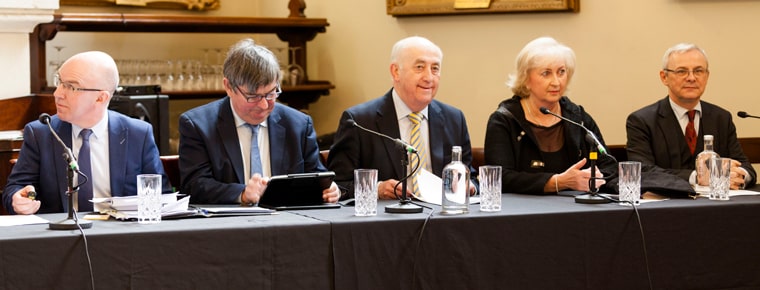 Pic: Cian Redmond
Pic: Cian Redmond
It is not judiciary's job to be popular, says Chief Justice
The new Judicial Council met for the first time this morning (Friday 7 February) at the Kings Inns, Constitution Hill, Dublin 7.
The Council consists of the entirety of Ireland’s judiciary and its establishment was first sought in a report by the judiciary 20 years ago.
This morning, committees will be established that will have responsibility for
- Setting ethics and conduct standards, and dealing with complaints,
- Providing ongoing professional education,
- Examining and making recommendations on personal Injuries awards, and
- Sentencing guidelines.
The importance of the independence of the judiciary was emphasised in the opening statement by the Chief Justice Frank Clarke, and the new body will work towards strengthening this.
Pressures
Opening the Council’s plenary session, the chief justice said: “In an increasingly complex legal environment, with much greater pressures than have applied in the past, maintaining the highest standards of excellence becomes a greater challenge.”
He said that the new Judicial Council would have mechanisms to: enhance judicial education and training, promote and enforce judicial ethics, encourage measures designed to increase sentencing consistency and, importantly, provide support for judges in the context of what is often a very challenging role.
Vital role
“By doing all this, the Judicial Council can play a vital role in promoting the excellence for which we all strive,” the chief justice said.
The council comprises the entire judiciary and will, therefore, be in a position to authoritatively assert judicial independence and respect for the rule of law, should it ever come under threat, the chief justice said.
“I think it is fair to say that Ireland has been a state where the rule of law has broadly been respected, and where the independence of the judiciary, which is a vital ingredient of respect for the rule of law, has been supported,” he said.
High standards
“I also think that it is fair to say that the Irish judiciary has observed high standards and has broadly commanded public respect.
“It would be impossible to expect that the public, or indeed the parties to litigation, would agree with every decision that every judge takes. It is the job of judges, under the Constitution, to administer justice, and thereby come to a fair decision in accordance with those laws which are enacted by the Oireachtas.
“We do justice, but we also do it in accordance with law. Not every result will, therefore, be popular. But it is not our job to be popular, but rather to do justice in accordance with law.”
But he said that, even if respect for the law continued in Ireland and judges continued to perform their duties conscientiously and well, it could not be assumed that such a state of affairs would necessarily continue without support.
“We have seen that the rule of law and the independence of judges has come under threat in other jurisdictions,” he said.
Complex
“In an increasingly complex legal environment, with much greater pressures than have applied in the past, maintaining the highest standards of excellence becomes a greater challenge,” he said.
He welcomed the fact that the entire judiciary was sitting at the first meeting of the Judicial Council. Public respect for the judiciary was an equally important component in maintaining the rule of law, and the Judicial Council could play a vital role in this.
He also said that the Council would, for the first time, allow the judiciary, as a whole, to speak with a single voice on issues of genuine importance.
“Much of the nuts and bolts of the work of the Council will, of course, be done through committees, some with lay membership in accordance with the legislation – and one of the most important functions of this first meeting of the Council will be to establish those committees.
Detailed work
“The important detailed work will then follow.
“This first meeting of the Judicial Council represents that first important step on what is likely to be an ongoing journey designed to protect the rule of law and the independence of the Irish judiciary – but also to enhance public understanding of, and respect for, that judiciary through promoting excellence.”
The website www.judicialcouncil.ie will go live today, though access to certain areas is expected to be restricted to specific users.
Gazette Desk
Gazette.ie is the daily legal news site of the Law Society of Ireland